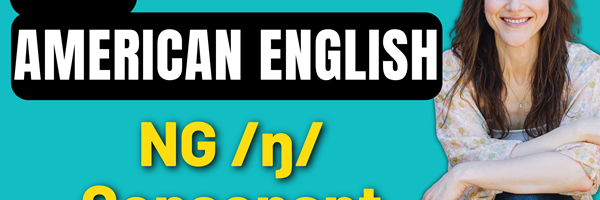(Video Transcript)
nice
under
plan
Let’s learn how to pronounce the N consonant sound in American English.
How to pronounce the N /n/ consonant
The N consonant sound is a nasal consonant in American English. This means that the soft palate is lowered as you say this sound, and this allows the air to exit out of the nose. The N consonant is also a voiced consonant, which means the vocal cords are turned on as you say it.
N, N, N
To make this sound, the lips open and the front of the tongue comes up to the roof of the mouth. The tongue is in a wide shape, and it makes complete contact with the roof of the mouth along the rim of the gums, all the way around from here to here. The back of the tongue is relaxed. The vocal cords turn on, and the air exits out of the nose.
N
You can feel the nasal vibration as you say this sound. Put your fingers on the sides of your nose and feel the buzz.
N
Watch an animation of the N consonant sound. This animation was created from actual videos of a real person pronouncing the N sound. The animation shows the side view of the person's face, and I slowed it down to half speed. Watch how the tongue tip comes up to the alveolar ridge and the soft palate moves down to allow air to escape out of the nose.
Let’s take a closer look at the N consonant sound.
The N /n/ consonant: Up close and in slow motion
Here is the N consonant in isolation. Notice how the front of the tongue comes up and makes contact with the front perimeter of the roof of the mouth. The tongue is flat and wide. The back of the tongue is relaxed. The lips open.
Now the word now. Again, notice the tongue is wide and flat, and the front comes up to make contact with the roof of the mouth along the front perimeter of the roof of the mouth.
Now the word tiny. Tongue is wide and flat and makes contact with the front perimeter of the roof of the mouth. The back of the tongue is relaxed.
It’s important to remember to relax the back of the tongue. If there is too much tension, or if the back of the tongue lifts up, then you will say the NG consonant, even if the front of the tongue is in the right spot for the N consonant.
Here’s what the N consonant sounds like wth the correct tongue position.
N, N, N
See how wide and flat my tongue is?
N, N, N
Now here’s what it sounds like if I tense or lift up the back of the tongue.
NNNGG, NNGG, NNGGG
Can you see the underside of my tongue lift up? That’s incorrect. The underside of the tongue should be relaxed - you don’t want to see any darkness under the back of the tongue.
If you see darkness under the back of your tongue, that means the back of the tongue is tensed and lifted. That’s the NG consonant. We want the N consonant, which is made with the front of the tongue only.
N /n/ consonant practice
Let’s practice a few words together. Say the words with me.
nice, N, nice
under, N, under
plan, N, plan
Thanks so much for practicing the N consonant sound with me. I hope this video was helpful! But we don’t have to end the practice here - let’s keep working together! Check out the additional practice videos of the N consonant sound in English Pro, my comprehensive online accent training community. The details on how to enroll in English Pro are in the description below. Thanks, and have a great day!
And I'd love to hear from you - contact me to learn how we can work together to perfect your American English pronunciation!



